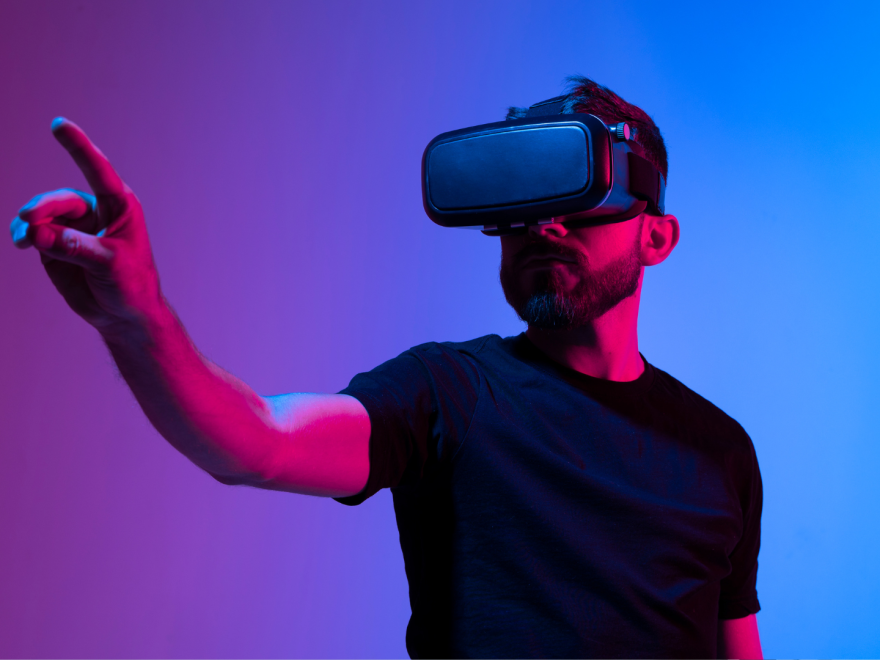Table of Contents
Introduction
The Metaverse is one of the most exciting technological concepts of the 21st century. It represents a virtual, interconnected digital world where users can interact, socialize, work, and play. Often described as the next evolution of the internet, the metaverse leverages virtual reality (VR), augmented reality (AR), blockchain, and AI to create immersive digital experiences.
In this guide, we will explore:
- What the Metaverse is
- How it works
- Key technologies driving it
- Industries being transformed
- Future predictions and investment opportunities
Related article: What is AI and how to make money with AI.
What is the Metaverse?
The Metaverse is a collective virtual shared space created by the convergence of physical and digital reality. It allows users to experience a persistent, immersive world where they can socialize, create, shop, work, and entertain themselves using avatars and digital assets.
Key Characteristics of the Metaverse:
- Persistent & Real-Time – The metaverse exists continuously, even when users are offline.
- Interoperable – Users can move assets and identities across platforms.
- Immersive Experiences – The use of VR, AR, and 3D environments enhances engagement.
- Decentralized Economy – Digital ownership, NFTs, and blockchain technology enable a new digital economy.
- Social & Collaborative – Users can interact, host events, and build communities.
How Does the Metaverse Work?
The Metaverse is powered by several advanced technologies that enable immersive experiences. Let’s explore these key elements:
1. Virtual Reality (VR) and Augmented Reality (AR)
- VR: Creates fully immersive experiences using devices like Meta Quest 3, HTC Vive, and PlayStation VR.
- AR: Enhances the real world with digital overlays, such as Microsoft HoloLens and Apple Vision Pro.
2. Blockchain & Cryptocurrencies
- Enables secure ownership of digital assets (e.g., NFTs, virtual land, digital goods).
- Provides decentralized finance (DeFi) options for transactions in the metaverse.
3. Artificial Intelligence (AI) & Machine Learning
- AI powers virtual assistants, NPCs, and automated avatars.
- Machine learning enhances real-time language translation and personalized experiences.
4. Cloud Computing & 5G
- Provides high-speed, low-latency connectivity for seamless experiences.
- Enables real-time streaming of 3D environments on lightweight devices.
5. Digital Avatars & Virtual Identity
- Users create avatars to interact in virtual worlds.
- Avatars can be customized with digital fashion and accessories (NFT-based).

Major Companies & Platforms Building the Metaverse
Several tech giants and startups are investing in building metaverse ecosystems. Here are some of the leading players:
1. Meta (Facebook Metaverse)
- Invested heavily in Horizon Worlds, Quest VR headsets, and AI-driven avatars.
- Focused on social experiences, virtual workspaces, and gaming.
2. Microsoft Metaverse
- Developed Microsoft Mesh, enabling enterprise virtual collaboration.
- Integrated metaverse tools in Teams & Office 365.
3. Decentraland (MANA)
- A decentralized virtual world where users can buy virtual land, interact, and build businesses.
- Uses Ethereum blockchain and NFTs for asset ownership.
4. The Sandbox (SAND)
- A gaming-focused metaverse allowing users to create, own, and monetize virtual experiences.
- Features NFT-based real estate and digital assets.
5. Apple & Google
- Apple is developing mixed reality headsets (Apple Vision Pro) to enhance AR applications.
- Google focuses on AI-powered AR tools and virtual search capabilities.
Industries Being Transformed by the Metaverse
The metaverse is not just about gaming—it is set to revolutionize multiple industries:
1. Gaming & Entertainment
- Games like Fortnite, Roblox, and Axie Infinity already operate as metaverse-like worlds.
- Virtual concerts (e.g., Travis Scott in Fortnite) attract millions of viewers.
2. E-Commerce & Retail
- Virtual malls and digital storefronts allow users to try and buy virtual and real-world products.
- Brands like Nike, Gucci, and Adidas are launching digital fashion collections.
3. Real Estate & Virtual Land Ownership
- Companies and individuals are buying digital land in metaverse platforms (e.g., Decentraland, The Sandbox).
- Virtual real estate is being monetized through events, advertising, and NFT sales.
4. Remote Work & Virtual Offices
- Platforms like Microsoft Mesh and Meta Horizon Workrooms enable virtual meetings and remote collaboration.
- Companies are adopting metaverse workspaces for enhanced productivity.
5. Education & Training
- Virtual classrooms and simulations improve remote learning.
- Industries like medicine and aviation use metaverse simulations for training.
6. Healthcare & Telemedicine
- AI-driven virtual doctors and 3D medical simulations enhance healthcare services.
- AR-assisted surgeries improve precision and patient outcomes.
7. Social Networking & Virtual Events
- People will interact through virtual spaces, replacing traditional social media.
- Weddings, concerts, and conferences are being hosted in virtual environments.
Future Predictions for the Metaverse (2025-2035)
1. The Metaverse Economy Will Grow to $5-10 Trillion
- Financial analysts predict the metaverse could become a multi-trillion-dollar industry within a decade.
2. AI-Powered Avatars & Assistants Will Become the Norm
- Digital AI assistants will handle tasks like customer service, content creation, and business operations.
3. Physical and Virtual Worlds Will Merge Seamlessly
- AR glasses and wearable devices will make virtual interactions part of daily life.
4. More Jobs Will Be Created in the Metaverse
- Professions like virtual architects, digital fashion designers, and metaverse marketers will emerge.
5. Decentralized & User-Owned Metaverses Will Dominate
- Blockchain-based metaverse platforms will gain more popularity over corporate-controlled virtual worlds.
Investing in the Metaverse: Opportunities & Risks
Best Investment Opportunities in the Metaverse
- Metaverse Stocks: Meta, Microsoft, NVIDIA, Unity Technologies.
- Cryptocurrency & Blockchain: Ethereum, Decentraland (MANA), The Sandbox (SAND).
- Virtual Land & NFTs: Buy land in Decentraland, The Sandbox, and Cryptovoxels.
Risks to Consider
- Regulatory Uncertainty – Governments may introduce laws restricting metaverse activities.
- Technology Challenges – High development costs and hardware limitations.
- Privacy & Security Issues – Data protection concerns in immersive virtual spaces.
Conclusion
The metaverse is the future of digital interaction, combining VR, AR, AI, and blockchain to create immersive virtual experiences. While still in its early stages, the metaverse has the potential to redefine industries, social interactions, and economic systems.
As more companies, developers, and users engage with virtual worlds, the metaverse will continue evolving into a thriving digital ecosystem. Whether for business, entertainment, or education, the metaverse is set to be a game-changer in the coming decades.

